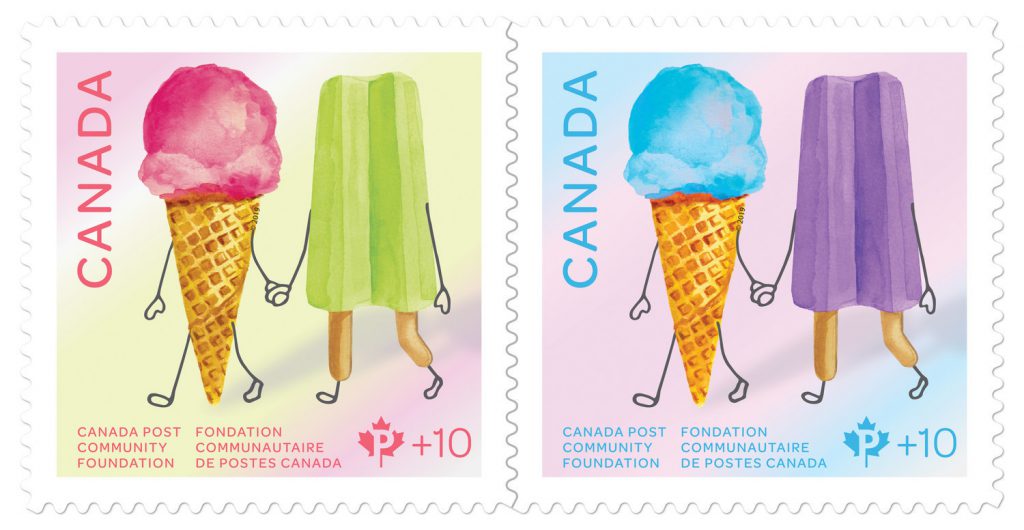$1.2M raised from last year’s semi-postals donated to nearly 120 groups this September
Now in its eighth year, Canada Post’s annual semi-postal issue is once again aiming to raise much-needed funding for grassroots and community-based organizations across the country.
The two-stamp issue – a first for Toronto’s Chad Roberts Design – is the work of creative director Chad Roberts with illustrations by the studio’s senior designer Joanna Todd.
Featuring a pair of whimsical frozen treats strolling hand in hand, the colourful stamps kindle nostalgia for hot summer days and promote a childhood filled with sweet memories.
“It’s up to us to help make it that way,” adds a press release issued by Canada Post on Sept. 23, the day the semi-postals were issued nationwide.
A total of 170,000 booklets of 10 stamps were printed by the Canadian Bank Note Company using six-colour lithography.
An additional 7,000 official first-day covers (OFDC) were serviced with an Ottawa cancel.

An official first-day cover with an Ottawa cancel was also released as part of this year’s semi-postal issue. Again, each stamp carries a 10-cent surcharge.
SURCHARGED STAMPS
An extra dollar is charged for each 10-stamp booklet – plus an extra 20 cents for every OFDC – and this money goes directly to the Canada Post Community Foundation, which has supported more than 660 non-profit organizations since its creation.
With more than $1 million raised last year alone, Canada Post officials are hoping to meet or exceed this amount in 2019 to provide additional funding for next year’s programs.
On Sept. 23, as the new semi-postals went on sale to raise funds for 2020, the Canada Post Community Foundation announced about $1.2 million would be granted to 118 groups for this year’s grants.
Among this year’s recipients are:
- Kids Help Phone, which helps children and youth through 24/7 bilingual professional counselling and support services;
- Easter Seals Alberta, which manages the Camp Horizon Earth Program, an adaptive hiking program for children with disabilities or medical conditions; and
- Les YMCA du Québec, which manages the Alternative Suspension Program, supporting suspended students who benefit from more structure than traditional school suspensions offer.
In addition to the annual stamp issue, the Community Foundation raises funds through a five-week in-store campaign to solicit point-of-sale donations from customers; from local fundraisers by employees; and a year-round employee payroll donation program.
All funds go to organizations operating in the province or territory in which they were raised.
Over the past eight years, the Community Foundation has granted more than $8 million to hundreds of initiatives. They include literacy and language programs, youth outreach services, gender and sexual diversity programs, arts and recreation projects, special education programs, childhood health programs, anti-bullying initiatives, mentoring programs and more.

Canada’s first semi-postal stamps were issued to help fund the country’s first Olympic Games, which were hosted by Montréal in 1976.
PREVIOUS SEMI-POSTALS
In the mid-1970s, Canada became the first country in North America to issue a semi-postal stamp with its series supporting the Summer Olympics in Montréal (Scott #B1-B12).
The federal government committed to funding the 1976 Olympics through the sale of semi-postals plus other collectibles, including coins; however, even if all of the hundreds of millions of stamps sold, the total amount raised would’ve fallen short of the more than $10 billion the event eventually cost.
Following the 1974-76 Olympic semi-postals, Canada’s Post Office Department, which became a Crown corporation known as Canada Post in 1981, refrained from philatelic fundraising for another 20 years.
Then, in 1996, a new semi-postal was issued to support ABC Canada’s family literacy programs.
About a decade later, Moya Greene, then president of Canada Post, rolled out a new series of semi-postals issued to support the newly created Canada Post Foundation for Mental Health.
In 2012, the program was changed to support another new foundation, the Canada Post Community Foundation.
Production of Canada’s modern semi-postals has been low – starting at 10 million in 2012 and dropping to about a 10th of that amount in recent years.
For more information, visit canadapost.ca.


